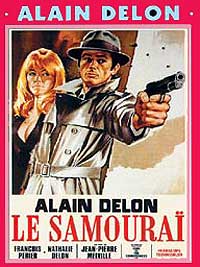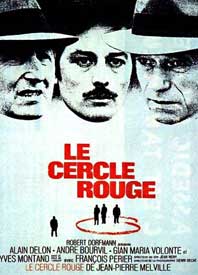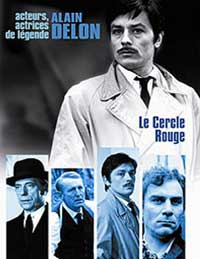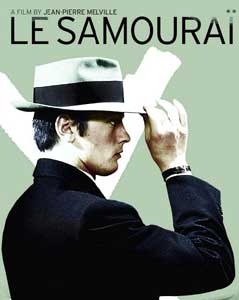Alain Delon is Jef Costello, or Le Samourai (1968). He takes being the strong silent type to nearly psychotic heights of grandeur. He's a beautiful fellow, an intelligent hitman with an eye for the details of a hit, who never fails to obtain his target, & has never until now even come close to being caught. When betrayal causes things to go awry, he becomes "the wounded wolf," & there's no one to rely on but himself.
 A brutal film for 1960s standards in Europe or America, cinema has become so much more violent in the meantime. Even so, Les Samourai has not lost its power because it gets in so close to the dour fatalistic protagonist. A brutal film for 1960s standards in Europe or America, cinema has become so much more violent in the meantime. Even so, Les Samourai has not lost its power because it gets in so close to the dour fatalistic protagonist.
Even though he would seem to be "the villain" since he kills people for money, we instinctly see something noble in him, like the proverbial wolf he is compared to, & it is probably no accident that his story begins in part to revolve around a beautiful black nightclub singer (Cathy Rosier) who wears a tiger-striped coat. This seeming nobility plays out as much more than a handsome illusion in the last minutes of the film.
Melville's gangster films are inspired by American film noir & Costello wearing a trenchcoat & hat that would've been familiar to a Bogart character is no accident.
But really the attitude of Le Samourai is most like classic "cruel" jidai-geki or samurai films from around the same decade, just as the film's title acknowledges. Costello on some level is the same as the nihilistic ronin characters played by Tatsuya Nakadai in such films as Harakiri & Sword of Doom.
Japanese cinema was making huge waves throughout the European film festival scene, & the influence of many such films' poetry-tinged ultra-violence runs deep in Melville's inspiration.
Even though cinema has gotten more violent on the surface in the decades sense, it has tended to be a lot shallower; Le Samourai like the best cruel jidai geki has something more awful & more beautiful deep in its spirit that is rarely duplicated nowadays. It is this very depth that makes Le Samourai one of the truly great gangster movies, having so horrifically & aesthetically captured a deadly serious warrior ethos such as is so rare in films outside of Japan.
It is a film of long pauses & long silences, not really an action film, yet with camera motion & viewer involvement with the character, a scene like the famous Metro chase which in reality is hardly more than riding the subway, becomes infused with tension despite how little actually happens. The image of Costello walking down a Parisian street has the same beauty as a medieval samurai walking along the Tokaido Road.
Every support role is praiseworthy but nothing matches the terrifying elegance of Delon as Costello. No matter what he is doing -- from slowly treating his own wound or gazing with eerie awareness at his pet bird, to shooting someone point blank -- he owns the film.
Trying to fathom Jef's hidden heart becomes more important than the expectation of explosive moments. The eeriness & suspense of the film comes not from the simple plot but from the dissonance of Jef's physical beauty at odds with his frozen soul & stoic gaze & calculating nihilism, a warrior spirit that in our era surely contains a seed of madness.
The viewer holds a vast interest in how Jef's fate works out; his condition matters. Waiting to see whether or not his mask of non-emotion breaks becomes an agonizing edge-of-your-seat thrill ride even as the film's pacing is like in a dream in which one can only move slowly toward catastrophe.
The word "masterpiece" is bandied about for a lot of trivial films, but if Le Samourai does not merit that acolade, no film does.
 Regarded by many as a great classic of crime cinema, I found the asperation of Le Cercle Rouge (1970) to be a full color latter-day film noir less than successful, the more so compared to the same director's great gangster film Le Samourai. Regarded by many as a great classic of crime cinema, I found the asperation of Le Cercle Rouge (1970) to be a full color latter-day film noir less than successful, the more so compared to the same director's great gangster film Le Samourai.
Where Le Samourai has a rivetting anti-hero at the central of the tale, Le Cercle Rouge loses focus with two central anti-heros travelling together, distinguishable more by mustache & jacket color than by personality, despite that one is again played by the appealing Alain Delon.
Where Le Samourai moves slowly like a battleship exuding enormous power, Le Cercle Rouge pokes along feeling about twenty minutes too long.
 Where Le Samourai has flourishes of camera work that convey a threatening mood even when nothing specific is going on, Le Cercle Rouge suffers from a confused though blandly formal editing technique. Where Le Samourai has flourishes of camera work that convey a threatening mood even when nothing specific is going on, Le Cercle Rouge suffers from a confused though blandly formal editing technique.
While Le Samourai's simple plot provides the bones of a tale of intense psychological mystery, the equally simple plot of Rouge is more on the nature of empty old-hat & cliche.
Even the generally impressive Yves Montand (much the best player here) as the police detective has more personality in two scenes feeding his cats than when on the trail of the escaped murderer Vogel (Gian-Maria Volonte) & the thief Corey (Delon).
The coldness of the script & the performances permits a certain phony hipness, but more it distances the characters & events too such a degree that it is difficult to care about them. The intended-to-be-shocking ending is merely par for the course, & rather perfunctory after so poky a build-up.
To great extent this is an attempt to recapture the greatness of Les Samourai which was so captivating that its pacing seemed deliberate rather than glacial, & its shocking bits effective not merely because violence shocks but because we're so pulled into the character of the nihilistic antihero & greatly want to know what he does or what happens to him.
When the two films are compared, Le Circle Rouge just doesn't rate very high. Le Samourai a masterwork of crime noir; Le Circle Rouge is a shallow mess.
copyright © by Paghat the Ratgirl
|

 A brutal film for 1960s standards in Europe or America, cinema has become so much more violent in the meantime. Even so, Les Samourai has not lost its power because it gets in so close to the dour fatalistic protagonist.
A brutal film for 1960s standards in Europe or America, cinema has become so much more violent in the meantime. Even so, Les Samourai has not lost its power because it gets in so close to the dour fatalistic protagonist.
 Where Le Samourai has flourishes of camera work that convey a threatening mood even when nothing specific is going on, Le Cercle Rouge suffers from a confused though blandly formal editing technique.
Where Le Samourai has flourishes of camera work that convey a threatening mood even when nothing specific is going on, Le Cercle Rouge suffers from a confused though blandly formal editing technique.